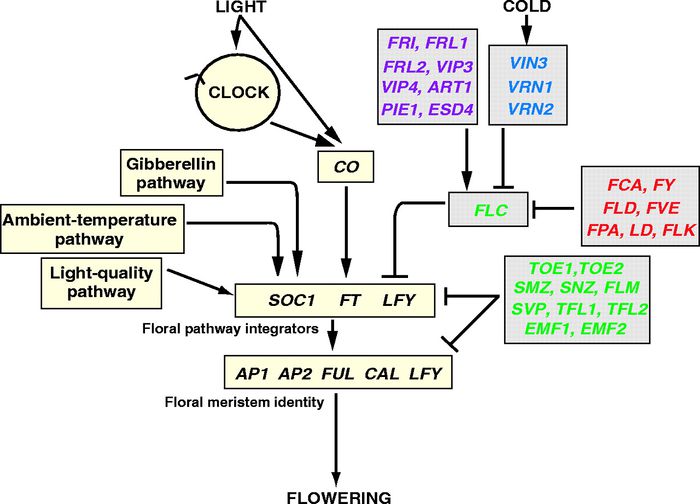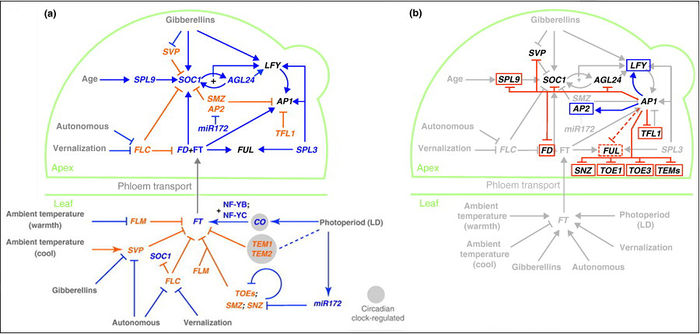Difference between revisions of "Time of bloom"
From GcatWiki
| Line 1: | Line 1: | ||
__TOC__ | __TOC__ | ||
| − | === | + | ===Flowering Pathway Over Time=== |
[[Image:Flowering_Pathway_2004.jpeg|700px]] | [[Image:Flowering_Pathway_2004.jpeg|700px]] | ||
| Line 8: | Line 8: | ||
<br/>Overall pathway for the time of bloom from [http://www.els.net/WileyCDA/ElsArticle/refId-a0002053.html Schneitz, 2009]. | <br/>Overall pathway for the time of bloom from [http://www.els.net/WileyCDA/ElsArticle/refId-a0002053.html Schneitz, 2009]. | ||
<br/><br/> [[Image:Flowering_Pathway_2010_2011.jpg|700px]] | <br/><br/> [[Image:Flowering_Pathway_2010_2011.jpg|700px]] | ||
| + | <br/>"The <i>Arabidopsis</i> floral transition network has been delineated as a result of extensive genetic analyses (depicted in a), but genome-wide studies have uncovered new molecular interactions and highlighted the role of AP1 as both a molecular switch and a network hub (shown in b)." | ||
<br/>Overall pathway for the time of bloom from [http://www.sciencedirect.com/science/article/pii/S0168952510001873 Wellmer and Riechmann, 2010] and [http://www.sciencedirect.com/science/article/pii/S0958166910002284 Ferrier et al., 2011]. | <br/>Overall pathway for the time of bloom from [http://www.sciencedirect.com/science/article/pii/S0168952510001873 Wellmer and Riechmann, 2010] and [http://www.sciencedirect.com/science/article/pii/S0958166910002284 Ferrier et al., 2011]. | ||
| − | |||
| − | ===Genes Involved=== | + | ===All Pathways=== |
| + | |||
| + | [http://dev.biologists.org/content/131/16/3829/F1.expansion.html Pathway 1]; [http://pcp.oxfordjournals.org/content/46/8/1175/F7.expansion Pathway 2]; [http://dev.biologists.org/content/136/20/3379/F3.expansion.html Pathway 3]; [http://5e.plantphys.net/article.php?ch=1&id=375 Pathway 4]; [http://www.plantcell.org/content/16/suppl_1/S18/F2.expansion Pathway 5]; [http://openi.nlm.nih.gov/detailedresult.php?img=3039610_1471-2164-12-63-6&query=the&fields=all&favor=none&it=none&sub=none&uniq=0&sp=none&req=4&simResults=f0a0c433%20f0a1c418%20f0a2c0%20f1a0c161%20f2a0c444%20f2a1c438%20f3a0c224%20f4a0c18%20f4a1c1%20f4a2c23&npos=37&prt=2 Pathway 6]; [http://openi.nlm.nih.gov/detailedresult.php?img=3049749_2041-9139-2-4-1&query=the&fields=all&favor=none&it=none&sub=none&uniq=0&sp=none&req=4&simCollection=1187896_1471-2202-6-48-3&npos=55&prt=3 Pathway 7]; [http://www.sciencedirect.com/science/article/pii/S1369526611001440 Pathway 8]; [http://www.pnas.org/content/107/39/17029/F6.expansion.html Pathway 9]; [http://www.sciencedirect.com/science/article/pii/S0168952510001873 Pathway 10]; [http://www.sciencedirect.com/science/article/pii/S1084952108000566 Pathway 11]; [http://www.sciencedirect.com/science/article/pii/S1360138504002705 Pathway 12]; [http://www.mpipz.mpg.de/305695/Project_1 Pathway 13]; [http://www.sciencedirect.com/science/article/pii/S009286740600571X Pathway 14]; [http://www.sciencedirect.com/science/article/pii/S1369526602000146 Pathway 15]; [http://www.els.net/WileyCDA/ElsArticle/refId-a0002053.html Pathway 16]; [http://www.sciencedirect.com/science/article/pii/S0958166905000273 Pathway 17]; [http://www.sciencedirect.com/science/article/pii/S0958166910002284 Pathway 18] | ||
| + | |||
| + | |||
| + | ===All Genes Involved=== | ||
{| class="wikitable" | {| class="wikitable" | ||
Revision as of 05:29, 14 February 2013
Flowering Pathway Over Time

Overall pathway for the time of bloom from Henderson and Dean, 2004.
Error creating thumbnail: Unable to save thumbnail to destination
Overall pathway for the time of bloom from Schneitz, 2009.

"The Arabidopsis floral transition network has been delineated as a result of extensive genetic analyses (depicted in a), but genome-wide studies have uncovered new molecular interactions and highlighted the role of AP1 as both a molecular switch and a network hub (shown in b)."
Overall pathway for the time of bloom from Wellmer and Riechmann, 2010 and Ferrier et al., 2011.
All Pathways
Pathway 1; Pathway 2; Pathway 3; Pathway 4; Pathway 5; Pathway 6; Pathway 7; Pathway 8; Pathway 9; Pathway 10; Pathway 11; Pathway 12; Pathway 13; Pathway 14; Pathway 15; Pathway 16; Pathway 17; Pathway 18
All Genes Involved
| Abbreviation | Name | DNA Sequence Available At |
|---|---|---|
| AG | Agamous | NCBI |
| AGL19 | Agamous-Like 19 | NCBI |
| AGL24 | Agamous-Like 24 | NCBI |
| AP1 | Apetala 1 | NCBI |
| AP2 | Apetala 2 | NCBI |
| AP3 | Apetala 3 | NCBI |
| ARP6 | Actin-Related Protein 6 | NCBI |
| ART1 | Aerial Rosette 1 | UniProt (AA) |
| CAL | Cauliflower | NCBI |
| CCA1 | Circadian Clock Associated 1 | NCBI |
| CLF | Curly Leaf | NCBI |
| CO | Constans | NCBI |
| CRY1 | Cryptochrome 1 | NCBI |
| CRY2 | Cryptochrome 2 | NCBI |
| CRY3 | Cryptochrome 3 | NCBI |
| EBS | Early Bolting in Short Days | NCBI |
| EFS | Early Flowering in Short Days | NCBI |
| ELF3 | Early Flowering 3 | NCBI |
| ELF4 | Early Flowering 4 | NCBI |
| ELF7 | Early Flowering 7 | NCBI |
| ELF8 | Early Flowering 8 | NCBI |
| EMF1 | Embryonic Flower 1 | NCBI |
| EMF2 | Embryonic Flower 2 | NCBI |
| ESD4 | Early Under Short Days 4 | NCBI |
| FCA | Flowering Time Control Alpha | NCBI |
| FD | FD | NCBI |
| FES1 | Frigida-Essential 1 | NCBI |
| FIE | Fertilization-Independent Endosperm | NCBI |
| FKF1 | Flavin-Binding/Kelch Repeat | NCBI |
| FLC | Flowering Locus C | NCBI |
| FLD | Flowering Locus D | NCBI |
| FLK | Flowering Locus K | NCBI |
| FLM / MAF1 / AGL27 | Flowering Locus M | NCBI |
| FPA | Flowing Time Control | NCBI |
| FRI | Frigida-Like | NCBI |
| FRL1 | Frigida-Like 1 | NCBI |
| FRL2 | Frigida-Like 2 | NCBI |
| FT | Flowering Locus T | NCBI |
| FUL / AGL8 | Fruitfull | NCBI |
| FVE | Nucleosome/Chromatin Assembly Factor Group C | NCBI |
| FY | Flowing Time Control | NCBI |
| GAI | Gibberellic Acid Insensitive | NCBI |
| GI | Gigantea | NCBI |
| Hd1 | Histone Deacetylase 1 | NCBI |
| LD | Luminidependens | NCBI |
| LFR | Leaf and Flower Related | NCBI |
| LFY | Leafy | NCBI |
| LHP1 | Like Heterochromatin Protein 1 | NCBI |
| LHY | Late Elongated Hypocotyl | NCBI |
| LMI1 | Late Meristem Identity 1 | NCBI |
| LUG | Leunig | NCBI |
| MAF2 / AGL31 | MADS Affecting Flowering 2 | NCBI |
| MAF3 | MADS Affecting Flowering 3 | NCBI |
| MAF4 | MADS Affecting Flowering 4 | NCBI |
| MAF5 | MADS Affecting Flowering 5 | NCBI |
| MIR172A | MicroRNA 172 A | NCBI |
| MIR172B | MicroRNA 172 B | NCBI |
| PAF1 | Proteasome Subunit Alpha | NCBI |
| PFT1 | Phytochrome and Flowering Time 1 | NCBI |
| PHYA | Phytochrome A | NCBI |
| PHYB | Phytochrome B | NCBI |
| PHYC | Phytochrome C | NCBI |
| PHYE | Phytochrome E | NCBI |
| PI | Pistillata | NCBI |
| PIE1 | Photoperiod-Independent Early Flowering 1 | NCBI |
| PIF4 | Phytochrome Interacting Factor 4 | NCBI |
| PNF | Pound-Foolish | NCBI |
| PNY | Pennywise | NCBI |
| RGA | Repressor of GA | NCBI |
| SAP18 | SIN3 Associated Polypeptide P18 | NCBI |
| SEP3 | Sepallata | NCBI |
| SEU | Seuss | NCBI |
| SMZ | Schlafmutze | NCBI |
| SNZ | Schnarchzapfen | NCBI |
| SOC1 / AGL20 | Supressor of Overexpression of Constans 1 | NCBI |
| SPL3 | Squamosa Promoter-Binding-Like Protein 3 | NCBI |
| SPL9 | Squamosa Promoter-Binding-Like Protein 9 | NCBI |
| SPY | Spindly | NCBI |
| STM | Shoot Meristemless | NCBI |
| SVP / AGL22 | Short Vegetative Phase | NCBI |
| SYD | Splayed | NCBI |
| TEM1 | Tempranillo 1 | NCBI |
| TEM2 | Tempranillo 2 | NCBI |
| TFL1 | Terminal Flower 1 | NCBI |
| TFL2 | Terminal Flower 2 | NCBI |
| TOC1 | Timing of CAB Expression | NCBI |
| TOE1 | Target of EAT 1 | NCBI |
| TOE2 | Target of EAT 2 | NCBI |
| TOE3 | Target of EAT 3 | NCBI |
| TSF | Twin Sister of FT | NCBI |
| UFO | Unusual Floral Organs | NCBI |
| VIN3 | Vernalization Insensitive 3 | NCBI |
| VIP | Vernalization Independence | NCBI |
| VIP3 | Vernalization Independence 3 | NCBI |
| VIP4 | Vernalization Independence 4 | NCBI |
| VRN1 | Vernalization 1 | NCBI |
| VRN2 | Vernalization 2 | NCBI |
| ZTL | Zeitlupe | NCBI |